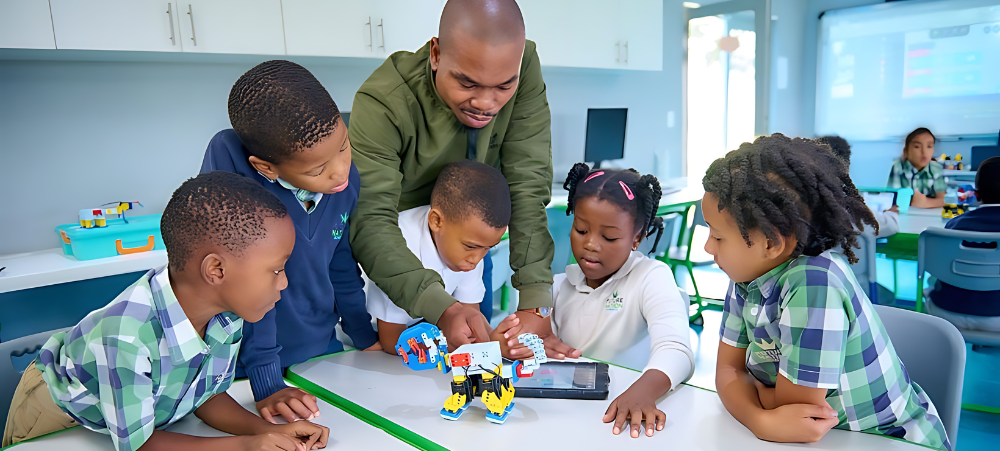Imagine our beloved gogos (grandmothers), who are just getting the hang of setting up their WhatsApp accounts, now being roped into helping with coding and robotics homework. It’s a funny image, but it highlights an important point: the digital revolution is touching all generations, and our role as educators is to bridge these gaps with patience and enthusiasm.
With the South African Department of Basic Education’s recent gazetting of the coding and robotics curriculum, educators across the nation are gearing up to integrate these modern, skills-based subjects into their classrooms. While this shift marks a significant advancement in preparing students for the digital age, it also brings a set of challenges and concerns for teachers. Here’s a comprehensive guide to addressing these concerns and helping teachers thrive in this new educational landscape.
The new coding and robotics curriculum represents a move towards a skills-based approach, focusing on practical application, problem-solving and critical thinking. Unlike traditional knowledge-based curricula, which emphasise theoretical understanding and memorisation, this new curriculum requires students to engage in hands-on activities and apply their learning in real-world contexts.
Common Concerns and Solutions
Lack of Experience and Training in Coding and Robotics
Many teachers feel unprepared to teach coding and robotics due to a lack of prior experience and training. Here’s how to tackle this:
- Professional Development: Enrol in professional development courses specifically designed for coding and robotics. Many online platforms offer free or affordable courses. Additionally, Future Nation College, part of The Sifiso Learning Group, offers comprehensive courses in coding and robotics, leveraging over seven years of experience in implementing these subjects through Project-Based Learning (PBL) at their Future Nation Schools.
- Peer Collaboration: Collaborate with colleagues who have experience in these subjects. Peer mentoring can provide valuable insights and practical tips.
- Educational Resources: Utilise the wealth of online resources available – these include tutorials, lesson plans and forums where educators share their experiences and solutions.
Limited Access to Resources and Technology
Schools may lack the necessary technology and resources to effectively teach coding and robotics. To address this:
- Resourceful Planning: Start with basic resources and gradually build your toolkit. Many coding activities can be conducted with minimal equipment, using free software like Scratch or online coding platforms.
- Funding and Grants: Explore funding opportunities and grants specifically aimed at STEM education. Many organisations and companies are willing to support schools in acquiring necessary technology.
- Partnerships: Partner with local businesses, universities and non-profits that may provide resources, support or mentorship programmes.
Adapting Teaching Methods
Transitioning from traditional teaching methods to a skills-based approach can be challenging. Here are some strategies:
- Project-Based Learning (PBL): Implement PBL, where students work on projects that require applying their coding and robotics skills to solve real-world problems. This method aligns well with the skills-based curriculum and enhances student engagement.
- Flexible Classroom Layouts: Arrange your classroom to facilitate group work and hands-on activities. Create learning stations where students can collaborate and experiment.
- Continuous Reflection: Regularly reflect on your teaching practices and seek feedback from students. Be open to making adjustments and trying new approaches to improve learning outcomes.
Assessment Challenges
Traditional assessment methods may not effectively measure student progress in a skills-based curriculum. Consider these approaches:
- Performance-Based Assessment: Use performance-based assessments, such as projects, presentations and practical tasks, to evaluate students’ skills and application of knowledge.
- Formative Assessment: Incorporate formative assessments to provide ongoing feedback. Encourage peer and self-assessment to promote reflective thinking and continuous improvement.
- Rubrics and Criteria: Develop clear rubrics and criteria for assessing both the process and the final product. This helps students understand expectations and areas for improvement.
Setting Yourself Up for Success
Embrace a Growth Mindset: Approach this new curriculum with a growth mindset. Embrace the opportunity to learn and develop new skills alongside your students.
Stay Informed and Updated: Keep abreast of the latest developments in coding and robotics education. Join professional networks and online communities where educators share resources, experiences and support.
Engage with the Community: Involve parents and the community in the learning process. Host coding and robotics showcases to demonstrate student projects and foster a supportive learning environment.
Leverage Technology: Utilise technology to enhance your teaching. Incorporate multimedia resources, interactive tools, and online collaboration platforms to create a dynamic and engaging learning experience.
Celebrate Achievements: Recognise and celebrate both small and large achievements in your classroom. This boosts student confidence and motivation.
The Sifiso Learning Group (SLG), through its Sifiso EdTech division, has been at the forefront of training teachers to transition to skills-based teaching. Over the past few years, Sifiso EdTech has trained over 300 teachers through intensive in-person deep dive sessions. These sessions encourage teachers to embrace new skills and give themselves the grace to learn, understanding that becoming proficient in coding and robotics is a journey.
Future Nation College, part of the same group, has been successfully implementing coding and robotics curricula for over seven years at SLG’s Future Nation Schools. Their expertise in Project-Based Learning (PBL) has proven effective in integrating these subjects into the curriculum, making them a valuable resource for teachers embarking on this new educational path.
Conclusion
The introduction of the coding and robotics curriculum in South African schools is a transformative step towards preparing students for a technology-driven future. While the transition may come with challenges, teachers equipped with the right strategies, resources and mindset can thrive in this new educational landscape. By embracing professional development, fostering collaboration and adopting innovative teaching methods, educators can successfully navigate this shift and provide their students with valuable, future-ready skills.
As teachers, let’s embrace this opportunity with open arms! Knowing that we are not alone in this journey and that with the right support, we can all succeed.
PS: To find out more about the new coding and robotics curriculum and how you can assist your child with this subject, tune into Sifiso EdTech’s free FutureTalk webinar at 6pm on 21 August where I’ll be joined by Miss Elspeth Mmatladi Khembo, Director of MST Curriculum Innovation and E-Learning at the Department of Basic Education as we walk parents and teachers through the subject.
Register here to attend the Zoom webinar.
By Xoliswa Mahlangu, Head of Digital Learning and Technology at Sifiso EdTech
About Sifiso EdTech
Sifiso EdTech is a proudly South African-based international provider of specialised coding and robotics products, teacher training, technology curricula and services.
Sifiso EdTech provides turn-key educational robotics solutions to schools – taking care of everything from setting up robotic centre infrastructure, to providing teachers with the necessary kits, teaching materials and training.
Sifiso EdTech is a Level 1 B-BBEE supplier of education technology and the official partner and distributor of the UBTECH education products. UBTECH is a global leading AI and humanoid robotic company with strong school curriculum for AI and robotics that meets and exceeds all the South African government requirements for robotics in schools.
Sifiso Edtech is part of the Sifiso Learning Group (Pty) (Ltd) portfolio, a private education group focused on the development of an African-centred education ecosystem founded by Sizwe Nxasana and Dr Judy Dlamini.
For more, visit www.sifisoedtech.com
Revolution through relevant, futuristic, Africa-focused and technology-enabled education.
Future Nation Schools, which has campuses in Fleurhof and Lyndhurst, offers quality,
affordable, African-centred education for Pre-School, Primary and High School.
The curriculum comprises an enhanced National CAPS curriculum, delivered through Project BasedLearning, and an IEB examination in Grade 12.
- Nurturing Tomorrow’s Innovators: The Role of Parents and Teachers in Coding and Robotics Education - November 21, 2024
- Play and project-based learning: cultivating future leaders through innovative education - September 11, 2024
- Embracing the New Coding and Robotics Curriculum:A Guide for South African Teachers - July 31, 2024





